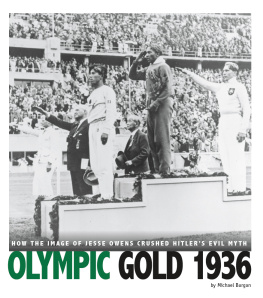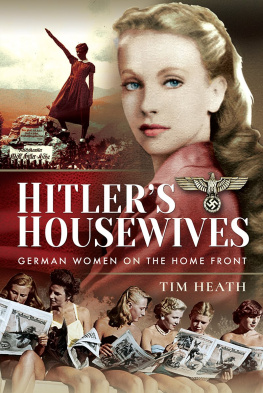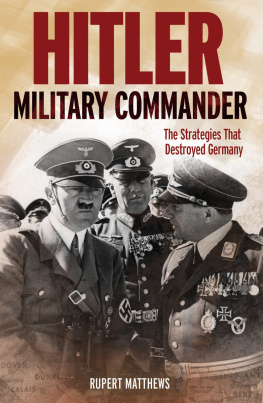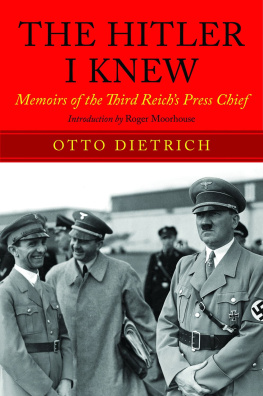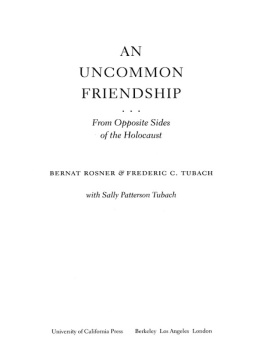German Voices
German Voices
Memories of Life during
Hitlers Third Reich
Frederic C. Tubach
with Sally Patterson Tubach

University of California Press, one of the most distinguished university presses in the United States, enriches lives around the world by advancing scholarship in the humanities, social sciences, and natural sciences. Its activities are supported by the UC Press Foundation and by philanthropic contributions from individuals and institutions. For more information, visit www.ucpress.edu .
University of California Press
Berkeley and Los Angeles, California
University of California Press, Ltd.
London, England
2011 by The Regents of the University of California
Library of Congress Cataloging-in-Publication Data
Tubach, Frederic C.
German voices: memories of life during Hitlers Third Reich / Frederic C. Tubach with Sally Patterson Tubach.
p. cm.
Includes bibliographical references.
ISBN 978-0-520-26964-4 (cloth: alk. paper)
1. National socialismSocial aspects. 2. GermanyHistory19331945. 3. GermanySocial conditions19331945. 4. GermanySocial life and customs20th century. 5. GermanyHistory19331945Biography. 6. World War, 19391945Social aspectsGermany. 7. World War, 19391945Personal narratives, German. I. Tubach, Sally P. (Sally Patterson), 1946 II. Title.
DD256.6.T83 2011
943.086dc22 2010051218
Manufactured in the United States of America
19 18 17 16 15 14 13 12 11
10 9 8 7 6 5 4 3 2 1
This book is printed on Cascades Enviro 100, a 100% postconsumer waste, recycled, de-inked fiber. FSC recycled certified and processed chlorine free. It is acid free, Ecologo certified, and manufactured by BioGas energy.
For Maria Tubach, ne Zink
CONTENTS
LIST OF FIGURES
PREFACE
I was born in San Francisco on November 9, 1930. In 1933, when I was three, my father and mother, Germans by birth, returned with me to Nazi Germany and the village of Kleinheubach on the Main River, southeast of Frankfurt. Shortly before I turned four, my mother died suddenly at the age of twenty-seven. I was raised first by my paternal grandparents and then by a stepmother, to whom this book is dedicated. Thus, I spent my childhood and teenage years in Germany during Hitlers ascent to power, World War II, and the immediate postwar years. An American by birth, I reclaimed my citizenship in 1949 and returned to California at the age of eighteen.
I belong to the young generation of Germans born between 1925 and 1935 who grew up during the most tumultuous period in twentieth-century German history, and I share many experiences, thoughts, and emotions with my German compatriots. After I returned to the United States, my life diverged drastically from those of relatives and friends I left behind. I came of age personally and intellectually while an undergraduate in foreign language studies and then as a graduate student in the German Department of the University of California at Berkeley. In addition to the professors in the French and German departments who guided my academic development, I became closely associated with many fellow students who had fled Nazi Germany because they were Jewish. Like me, they felt like cultural and social outsiders in California, even if our histories were not the same.
The personal bonds to my Jewish friends were strong and abiding. We spent lively hours discussing existentialism in Old Europe, a coffee shop on Telegraph Avenue, and socialized regularly together. Above all, we studied with an intense commitment not only to traditional German literature and culture, but also to the works and worlds of Shakespeare, Dante, Dostoevsky, and, of course, Franz Kafka. Anxious to make our way in a strange country, we were very much alike in harboring strong ambitions mixed with deep insecurities. Whatever our priorities and personal preferences, we shunned politics and were loath to dwell on our pasts in Germany. Protected within academia from the uncertainties we perceived in the world outside, we created our own world of the mind.
Then came the 1960s. That era, with its war protests and passionate championing of civil rights, woke me up politically, and I became active on the Berkeley campus in progressive causesmy way of giving shape to my antifascist views. In teaching German culture to undergraduates, I felt compelled to study the Holocaust as a personal and moral commitment. Yet the more I learned about this defining moment of twentieth-century German (and European) history, the more dissatisfied I became with the comprehensive explanations provided by an ever-growing body of academic research. There seemed to be a disconnect between academic explanations, on the one hand, and the horrors experienced by the victims of Nazism, on the other.
In the 1980s I became friends with Bernat Rosner, a Hungarian Jew and Auschwitz survivor. In the mid-1990s, at the age of sixty-two, Bernie decided he wanted to tell his story, one he had kept to himself ever since he was deported from his Hungarian village to Auschwitz, where his parents and brother were exterminated in the gas chambers. He wanted me to narrate his storya challenging undertaking for someone who had marched in a Jungvolk (PreHitler Youth) uniform at the same time Bernat was forced to wear concentration camp garb. The result of our joint efforts became An Uncommon Friendship: From Opposite Sides of the Holocaust (University of California Press, 2001; a revised edition with an epilogue was published in early 2010). Bernie and I appeared at many public events to read and discuss our double biographywhat we had experienced and who we had become.
Our common efforts at reconciliation and mutual understanding found a receptive audience, both in the United States and in Germany. At the core of our collaboration was the belief in the importance of the individual, and how the grand brush-strokes that serve to explain history tend to cover up precisely what we wanted to preservenamely, the value of individual lives and the texture of human experience in all its rich variety and complexity.
During the years of our public presentations, I was surprised to find a great interest in my experiences in Nazi Germany. I also became aware how little most Americans knew about life in Hitlers Third Reich beyond established clichs. Hitler attempted to destroy the individual identities of Jews through extermination en masse, but he also wanted to eliminate the individual identities of Germans, the better to use them as a monolithic instrument in fashioning his Nazi utopia.
Several years ago I began collecting letters and interviewing Germans who lived during the Third Reich, my intention being to counteract generalizations about all Germans that Hitler wanted the world to believe and to rebut the common belief that Germans who lived during that time are best understood by broad, condemnatory assertions. In order to make these differentiated German voices intelligible, I try to explain how Hitler manipulated the younger generation within his revolutionary system and how he was able to succeed so quickly. I believe that the German voices in this work illuminate the variety and complexity of circumstances that in fact existed during that terrible time, and that they open another window on Hitlers Third Reich. It is not my intention to present a polemic but merely to addfor the recordGerman voices that have not been sufficiently heard in the United States.
Frederic Tubach
Orinda, 2010
ACKNOWLEDGMENTS
I would above all like to express my deep respect and love for my stepmother, Maria Tubach, ne Zink. She was an outspoken anti-Nazi at a time when it was dangerous to admit it. She taught me that civil courage is a virtue and that swimming against the stream is sometimes a moral necessity.
Next page

